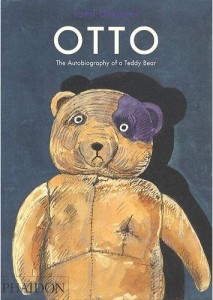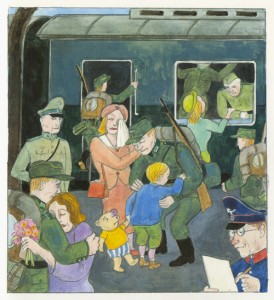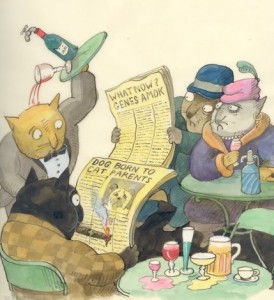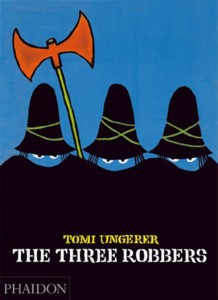Never judge a book by its cover…
 A couple of months ago, you may remember me blogging about my favourite books. Or maybe you don’t.
A couple of months ago, you may remember me blogging about my favourite books. Or maybe you don’t.
Well, whilst pulling together the threads of fiction that make up the literary tapestry of my life, I rediscovered Tomi Ungerer. Ungerer’s “The Three Robbers” was one of the most significant books of my childhood. Last week, as I walked past the new books display, I spotted this…
Remarkable not only because it’s by Ungerer, but because on that afternoon two months ago, I’d attempted to order a copy of this very book, only to be confronted with “out of stock” messages from all my usual “sources”. Serendipity, maybe? A delight, certainly.
Otto is the story of a German-made teddy bear, whose first memories are of being stitched together, and being given as a birthday present to his first owner, a young Jewish boy named David. This being the 1930s, Davids fate is to be taken away from his home by the Nazis – he just has enough time to hand Otto over to his best friend Oskar before leaving. So begins Otto’s journey through the events of the Second World War, across the Atlantic to America, and finally, well, finally to find happiness (though I won’t spoil the ending by telling you how).
Daniel Kraus, in Booklist on 1st October 2010 (p.81) describes how in the book, Ungerer “takes the coziest symbol of childhood… and transforms it into a battered but proud emblem of the perseverance of innocents”. In this book Tomi Ungerer deals with one of the darkest chapters of our history, prompting reflection and the consideration of important questions through a tale of a loving, naive protagonist which works on many levels. Dilemmas of ownership, care-taking and belonging sit alongside greater questions of hatred, genocide, war, bullying, homelessness, commercialism and then hope. It’s a huge scope for such a compact story, but it works. Part of the success is down to the illustrations; brutally honest and yet still childlike in their style. The page depicting the bombing of the unnamed German city, for example, contains bodies, a crushed baby pram, a disembodied hand, the pained expression of a dying man. And yet in it’s pencil and watercolour-like medium, the shocking content is somehow made almost “normal”.
 This is no comfortable fairy story. When we are shown Oskar and Otto saying goodbye to Oskars father as he heads off for war, the picture echoes many “departing soldier” images we’ve seen before. Yet perhaps unusually for a childrens book, the soldiers are all wearing Nazi uniforms. They are parting with wives, children and sweethearts, there are tears and farewell hugs, yet this is not quite what we are used to. Similarly, we are used to pictures of people sheltering from bombing raids in cellars in London, in other British towns…but not in Germany. Perhaps as depictions of events in Germany during the war have become taboo, especially in literature for the very young. But here Ungerer shows us life as he remembers it, growing up as he did in the occupied Alsace region.
This is no comfortable fairy story. When we are shown Oskar and Otto saying goodbye to Oskars father as he heads off for war, the picture echoes many “departing soldier” images we’ve seen before. Yet perhaps unusually for a childrens book, the soldiers are all wearing Nazi uniforms. They are parting with wives, children and sweethearts, there are tears and farewell hugs, yet this is not quite what we are used to. Similarly, we are used to pictures of people sheltering from bombing raids in cellars in London, in other British towns…but not in Germany. Perhaps as depictions of events in Germany during the war have become taboo, especially in literature for the very young. But here Ungerer shows us life as he remembers it, growing up as he did in the occupied Alsace region.
If our observation of wartime Germans doesn’t throw up enough discomforting thoughts, Ungerer’s astute evaluation of America’s treatment of it’s veterans is perhaps even more cutting. The black GI whose life crosses paths with the small bear, and who takes him across the pond to a new life, unwittingly returns to an impoverished and cruel existence once the initial glory has faded. And in this way, Otto reaches his lowest point, discarded amongst rubbish, a victim of violence, prejudice, and disregard – the irony of the advertisement “Enjoy life with Happy Cola” on the side of the building where Otto is found by a homeless woman is starkly obvious.
 On publisher Phaidons website, Tomi Ungerer has been described as saying that “while many people can see only good and evil, he is particularly interested in the no-man’s land between the two, as this is the most interesting place, where lessons can be learned”. In his books for children Ungerer covers themes such as prejudice, poverty and the holocaust. With his books they say Ungerer “wants to inspire children’s curiosity and imagination, but also to let them know that it’s OK to have problems, because you can find the courage to fight them”.
On publisher Phaidons website, Tomi Ungerer has been described as saying that “while many people can see only good and evil, he is particularly interested in the no-man’s land between the two, as this is the most interesting place, where lessons can be learned”. In his books for children Ungerer covers themes such as prejudice, poverty and the holocaust. With his books they say Ungerer “wants to inspire children’s curiosity and imagination, but also to let them know that it’s OK to have problems, because you can find the courage to fight them”.
From “Flix”, the eponymous son of a cat couple who are startled to discover that their newborn is a dog, to bad-kitty Piper Paw in “No Kisses for Mother”, who gives kids “permission” to be their real, flawed selves and still be forgiven and loved, Ungerer has never presented a straightforward fairy tale world to his younger readers.  As a child, I think I first loved “The Three Robbers” for the distinctive illustrations, then for the fact that it meant I could read the word ‘Blunderbuss’. As I grew up, and read the story to my younger brothers, I began to see another layer to the tale, of the power of love to provide redemption and rehabilitation. As an adult, I question whether the wicked robbers were ever really wicked to begin with, or whether our assumptions about their appearance, actions and the mythology of their status created this illusion to trap them within a stereotype. And this is the real magic of Ungerer’s work in this medium. It speaks to children through it’s simplistic, subtle but honest visuals, and plain, unfrilly language. It speaks to the growing child through its careful awareness of the fragility and balance of experience. And it speaks to adults bluntly, in a confrontational, questioning way. It’s even made me look differently at my mother, knowing as I do that she chose this book for the toddler-aged me!
As a child, I think I first loved “The Three Robbers” for the distinctive illustrations, then for the fact that it meant I could read the word ‘Blunderbuss’. As I grew up, and read the story to my younger brothers, I began to see another layer to the tale, of the power of love to provide redemption and rehabilitation. As an adult, I question whether the wicked robbers were ever really wicked to begin with, or whether our assumptions about their appearance, actions and the mythology of their status created this illusion to trap them within a stereotype. And this is the real magic of Ungerer’s work in this medium. It speaks to children through it’s simplistic, subtle but honest visuals, and plain, unfrilly language. It speaks to the growing child through its careful awareness of the fragility and balance of experience. And it speaks to adults bluntly, in a confrontational, questioning way. It’s even made me look differently at my mother, knowing as I do that she chose this book for the toddler-aged me!
“Otto” is shelved under 741.642 UNG for its illustrations, and as an award-winning example of a childrens book. It is, however, so much more. Go on, treat yourself to a read. If you want to find out more about Tomi Ungerer, we also have a copy of his autobiography, “Tomi: A childhood under the Nazis” at 940.53161 UNG, which includes lots more information about his controversial work for adults, and in the worlds of advertising and politics.
Book covers and illustrations copyright Tomi Ungerer and Phaidon Press.




Leave a Comment (note: all comments are moderated)